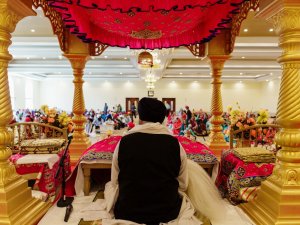Women farmers are the backbone of the agricultural sector. In the same way, they continue to form the backbone of the largest protest in history against the controversial Indian farm bills. The farmers’ protest in Delhi has seen women of all ages participating in large numbers, yet their roles and stories remain untold by mainstream media. This is the story of volunteer and protestor, Gurpreet Kaur (name changed to protect identity).
Convincing Her Mother
Gurpreet Kaur is a 23-year-old graduate from Barnala District, who has been volunteering at Singhu border since early December. She is the only young woman from her village who has joined the protests in Delhi, and comes from a landless labourers’ family. “I see other girls, including my friends who want to come to Delhi and be a part of the protests but their families don’t allow them.” Gurpreet spent a week trying to convince her mother to allow her to attend. “I packed my bags for ten days and fought for days so that they would let me come. Eventually, my mother came to Delhi and checked the arrangements herself at the Singhu Border. After seeing that the place is safe, she left within two hours and I ended up volunteering at the border for two months instead of the initial ten-day plan.”
Convincing the Panchayat
During a meeting of the village panchayat (council), Gurpreet was the only young female among 200 men who shared her ideas on plans regarding the farmers’ protests. “I did not get much response. It was disheartening in the beginning because they did not really listen or take me seriously,” she said. However, after a few more visits, Gurpreet said people started recognising and appreciating her. “The villagers came to my home very recently and gave their blessings. They said I’m doing great work for which they’d like to hold a meeting and commemorate my efforts. But I asked them to instead encourage other young girls to stand by me and take part in the movement. If even one other girl from the village joins me, I told them I’d be more than happy.”
Women Leadership at the Protest
Regarding the roles women are taking up at the protest, Gurpreet said that while she didn’t see as many Sikh women in leadership roles at present, many young women her age from university are gearing up for such positions. With more education, awareness, and a better response from men, Gurpreet imagines in the future, more women will take up these roles, not only in villages but also in major movements like these.
I asked Gurpreet why it was that On the Republic Day Kisan Rally, the majority of those who entered Delhi were men. She said that some of her female friends did join the tractor rally but at the same time the Samyukt Kisan Morcha (Joint Farmers Front) advised women to stay back because they did not trust police behavior and actions. Gurpreet said the Samyukt Kisan Morcha wanted to ensure that the rally happened smoothly and told the girls and women, “We don’t want a situation where the policemen misbehave and mistreat our women as that can enrage the men and create chaos. Then we have to decide, do we take care of the protest or you?”
But Gurpreet’s friends insisted on participating saying, “We can take care of ourselves and take our own responsibility,” and went ahead anyway.
Women Empowering Women
Many of the revolutions for women still start and stop at their homes. For instance, Gurpreet’s neighbour, a college student, asked her mother if she too could go to Delhi and volunteer. “Her mother gave her a good stare and that was the end of the conversation,” said Gurpreet who was present at the conversation. Gurpreet said that part of the reason why she has been vocal and present in these protests is because of her mother, who has been a huge support in empowering her to stand up for what she believes in.
“At one point, my mother told me to not pick up any phone calls from relatives because they would just try to persuade me to come back home. She said, ‘Tell me what you need and I will arrange it. You stay there and focus on your work.’ ” Gurpreet said that her mother is very open and forthright, and she has grown up seeing her fearlessly stand up for what she believes in. “My family doesn’t stop me. My father worries but then I make sure I tell him everything, reassure him of my safety, and he understands.”
Gurpreet spoke of Mata Bhag Kaur, Mata Sharan Kaur, and Mata Sulakhni, as well as fighters from 1984, weaving stories of their resilience that she remembers for inspiration. “These Sikh women have fought hard and long battles and there are many such stories that I have grown up reading about.”
Gurpreet tutored schooled children in the slums for two months at the Singhu Border. She is now back in her village and plans to mobilise more support for the farmers movement.
Photos by Shreya Sharma. Photos are not of Gurpreet Kaur.
About Shreya
Shreya is a writer and aspiring photographer based in Delhi. She recently completed her degreen in law and worked as a reporter with The Hindu in Mumbai before becoming a freelancer to pursue her new-born, ever changing creative callings. You can find some of her documentary work on the farmer protests on her Instagram: shhreya.sharma





